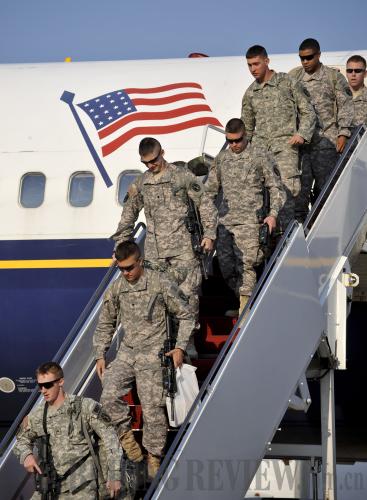|

The removal of all U.S. combat troops from Iraq in August signaled the approaching end of the Iraq War, which is the most significant regional war at the beginning of this century. Although there remain quite a few uncertainties, an honest review shows the war is a failure for the United States.
Generally, the simplest measure of success for a war is whether the instigator's own goals have been met. Based on this standard, the United States has obviously failed, as the Iraq War has brought it more harm than good.
Economic losses
 |
|
BACK HOME: American soldiers returning from Iraq arrive at Andrews Air Force Base near Washington, D.C. on August 28 (ZHANG JUN) |
The war has exacerbated the decline of the U.S. economic power. The United States is a war-loving nation, skilled at making profits from combat, and has spent 47 years at war.
The vast majority of U.S. wars have taken place on the territory of other countries, so Americans are most impressed not by the cruelty of war but by the wealth war brings.
In fact, war is a double-edged sword. Victories in war, such as those in World War I and World War II, boosted the U.S. economy. Failures in war, such as that in the Viet Nam War, led to economic recession and a weakening of national strength.
The Iraq War, which has lasted for seven years, has cost the United States $700 billion, far more than the Korean War or the Viet Nam War. As Joseph Stiglitz, a recipient of the Nobel Prize in Economics calculated in June 2008, including war pensions and medical costs, the United States had spent as much as $3 trillion on the Iraq War.
But the war did not generate the gains the United States expected. Instead, it has become a black hole consuming the U.S. national strength. In 2008, the financial crisis broke out in the United States and in the 2008-09 fiscal year, the U.S. federal budget deficit climbed higher than $1 trillion for the first time. As a result, many sounded cries of alarm at the decline of U.S. economic supremacy. This was definitely a result of the long-term Iraq War.
A strategic mistake
As war has worsened the situation in Iraq, the United States has been unable to achieve the strategic outcomes it hoped for.
Within two years of the September 11, 2001 terrorist attacks, the United States started two wars: the War in Afghanistan in 2001 and the Iraq War in 2003. The former was started hastily and was based more on revenge than on strategic considerations. The latter was conducted purposefully from the beginning. Iraq has rich oil reserves and is of great geopolitical importance. The United States launched the war hoping to turn Iraq into its new bulwark in the Middle East.
As U.S. troops withdrew from Iraq, however, the United States left two major things behind: a lack of security and a weak democracy. Despite the various shortcomings of Saddam Hussein's regime, Iraqi society was basically stable before the invasion. After the invasion, Americans rashly destroyed the original state apparatus by dissolving Iraq's army and ruling party, the Baath Party. The old world was broken, and a new world was never built. As a result, Iraq has been caught in an endless cycle of terrorist attacks ever since.
In the past seven years, more than 600,000 Iraqi civilians were killed, 4 million became refugees and 40 percent of the elite emigrated overseas. In July, 535 Iraqis were killed, marking the most deaths in one month in two years. As August began, the number of casualties continued to rise. On August 25, alone, 64 people lost their lives and 272 were injured in terrorist attacks. The once peaceful country has become a haven for terrorist activity. And without basic personal safety, political development and economic growth are moot points.
But the creator of this catastrophe, the United States, decided to leave, as it found the situation was out of control. In this regard, its withdrawal from Iraq was no different from its withdrawal from Viet Nam or the Soviet withdrawal from Afghanistan. These were not victorious escapes, but disgraceful defeats.
Another legacy of the U.S. invasion is "democracy." The transition from dictatorship to democracy in Iraq is supposed to be a good thing, but actually is not. This externally imposed democracy has created an inescapably weak Iraq.
Faced with a severe security situation and a poor economy, Iraq now needs centralization and an iron-fisted leader. But the United States has prescribed democracy as the only solution to these problems. The decision only made things worse, as democracy cost the government authority and efficiency. Most notably, Iraq has yet to form a new cabinet six months after parliamentary elections.
The ongoing political stalemate has taken a toll on the Iraqis' lives. They have been able to get electricity for only a few hours a day. Their drinking water has been occasionally contaminated. Trash has piled everywhere in the streets, among ruined buildings. And the victimized Iraqis must also deal with severe security conditions.
| 